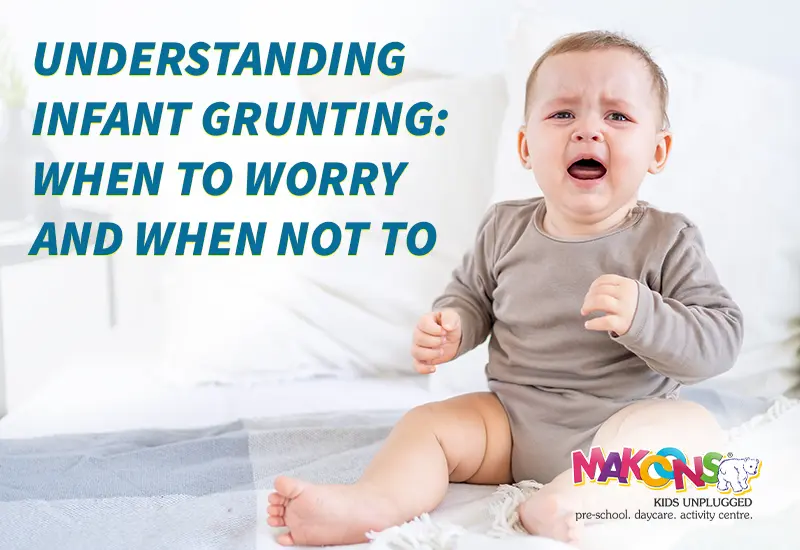Every sound your baby produces as new parents might set off a mix of wonder and worry. Of these sounds, baby grunting can be among the most confusing. Sometimes the little “ughh” noise coming from your quiet bundle of joy seems frightening and makes you wonder: Is this typical? Should my child see a doctor? Let’s investigate this common occurrence to enable you to differentiate between normal infant grunting and circumstances possibly requiring medical intervention.
What is Infant Grunting?
Early in their life, newborns often produce the ubiquitous sound known as baby grunting. Usually occurring during sleeping, eating, or when your infant is having a bowel movement, these grunting sounds are For new parents, the sounds can range from quiet, almost detectable moans to more forceful grunts that might raise questions. Knowing that most infants grunge is quite normal helps parents relax.
Why Do Babies Grunt? Common Causes-
1. Grunting Baby Syndrome (GBS)
Also called infant dyschezia, this is the condition whereby newborns find it difficult to coordinate the muscles required for bowel movements. Often instead of relaxing their pelvic floor, they push with their abdominal muscles while tightening it. Grunt sounds arise from the pressure this discrepancy generates. Though it seems awkward, the stool passes and usually is soft and regular.
2. Immature Digestive System
Because a newborn’s digestive tract is still developing, eating can be more difficult than for adults. As they eat, this immaturity can cause gas, pain, and newborn grunting. Babies trying to pass gas or feces through their system can produce the sounds.
3. Learning Proper Muscle Coordination
Babies are still developing their ability to coordinate the muscle actions needed for effective bowel motions. Sometimes they hold their breath and tightly contract their abdominal muscles against a closed glottis, producing that distinct grunting sound as they push. This is a natural stage of their growth.
4. Breathing Patterns and Airway Clearance
As babies cough mucous from their airways, some newborn grunting results. Newborns mostly breathe through their nose; any congestion might cause grunting sounds as they try to keep open airways. Babies also have erratic breathing patterns as their respiratory systems develop; occasionally, this causes grunting at the end of an exhaled breath.
5. Communication and Self-Soothing
Grunting can develop as early communication or self-soothing for growing babies. These sounds could signal everything from satisfaction to annoyance or just your child playing with their voice.
When Is Infant Grunting Normal?
Knowing whether the causes of baby grunting are benign will help to reassure you. Usually, grunting is taken for normal when:
- Mostly it happens with bowel motions.
- It occurs sometimes during sleep; it is not accompanied by any other worrisome symptoms.
- Your infant is getting weight in line and is feeding well.
- The grunting stops on its own in a few minutes.
- Throughout awake times, your infant stays attentive and responsive.
Many parents ask, “Is newborn grunting normal?” Generally speaking, the answer is yes. Usually around three to four months of age, clinicians refer to “grunter’s baby syndrome” as something that normally resolves on its own as your baby’s digestive system develops.
When Should You Be Concerned?
Although most newborns grunting is benign, some circumstances call for medical care. See your pediatrician if the grunting of your infant matches:
- Flare nostrils
- Retractions in the chest—skin pulling between the ribs during breathing
- Blue discolouration around the face or mouth
- quick breathing—more than sixty breaths per minute—while at rest
- Fever
- Reduced levels of eating or activity
- Every breath results in continuous groaning.
- Extreme pain with a bowel movement or weeping not able to be calmed down.
- Stools that are hard or indicators of actual constipation
These symptoms might point to a lung condition, an infection, or major digestive problems calling for quick medical attention.
Effective Home Remedies for Baby Grunting-
Several mild baby grunting treatments can help if your baby’s grunting is connected to digestive problems:
1. Exercise for Bicycle Legumes
Lay your infant on their back and gently cycle their legs. This easy activity can assist release trapped gas and increase bowel movements, so helping to perhaps minimize digestive-related grunting.
2. Warm bath
A warm bath helps your baby’s muscles relax, thereby possibly facilitating bowel motions and reducing the need for grumbling. Additionally general comfort and relaxation can come from the warm water.
3. Modest Tummy Massage
To help move gas along and boost the digestive process, gently massage your baby’s tummy using clockwise circular motions. To make the massage more pleasant, dab a little coconut or baby oil.
4. Effective Burping Methods
After meals, making sure you burp completely will help to prevent gas accumulation that can cause grunting and pain. To find what best for your infant, try several positions like sitting straight forward with support or over-the-shoulder.
5. Correct Sitting Positions
Make sure bottle-fed newborns are semi-upright to reduce air swallowing. Good latching helps breastfed babies minimize air intake during eating.
6.Tummy Time
Apart from strengthening neck and shoulder muscles, regular supervised tummy time gently presses the abdomen, which can help ease gas and facilitate digestion.
7. Warm Pressing
Gentle application of a warm (not hot) compress to your baby’s abdomen will assist ease gas and discomfort, so perhaps lowering grunting related to digestive problems.
Also Read- List of Top Nutritious Food for Your Baby While Traveling
Creating a Supportive Environment
Beyond particular treatments, keeping an atmosphere that supports your baby’s growing digestive system will help to reduce grunting:
- React fast to hunger signals to stop weeping from causing too much air swallowing.
- Keep your feeding space peaceful.
- Choose appropriately sized diapers free of pressure on the abdomen.
- Develop regular feeding schedules.
- If your infant seems uncomfortable after bigger feeds, think about smaller, more frequent feedings.
Navigating Parental Concerns
Particularly for first-time parents, the sounds of baby grunting might cause great worry. Remember that, whenever you’re worried, asking questions of healthcare professionals is always reasonable. If necessary, record patterns in your baby’s grunting—that is, related behaviors—along with their duration to provide to her pediatrician.
Trust Your Parental Instincts
Though most infant grunting is benign, parents should follow their gut feeling. You know your infant best. See a doctor if something about your baby’s grunting appears odd or if changes in behavior, hunger, or other worrisome signs accompany it.
Conclusion
One of many amazing features of newborn growth is infant grunting. Knowing the variations between typical developmental grunts and perhaps alarming symptoms helps parents to react correctly without needless anxiety. As newborns grow and learn better control over their digestive and respiratory systems, most grunting disappears organically. Indigestion remedies for kids is very Important.
Recall that every baby grows at their own speed. You may negotiate this part of babyhood with confidence and peace of mind by keeping educated, noting trends, and keeping open lines of contact with your pediatrician. Like other facets of parenting, the best basis for guiding your baby through each developmental milestone—including grunting—is a combination of knowledge, intuition, and sensible medical advice.


